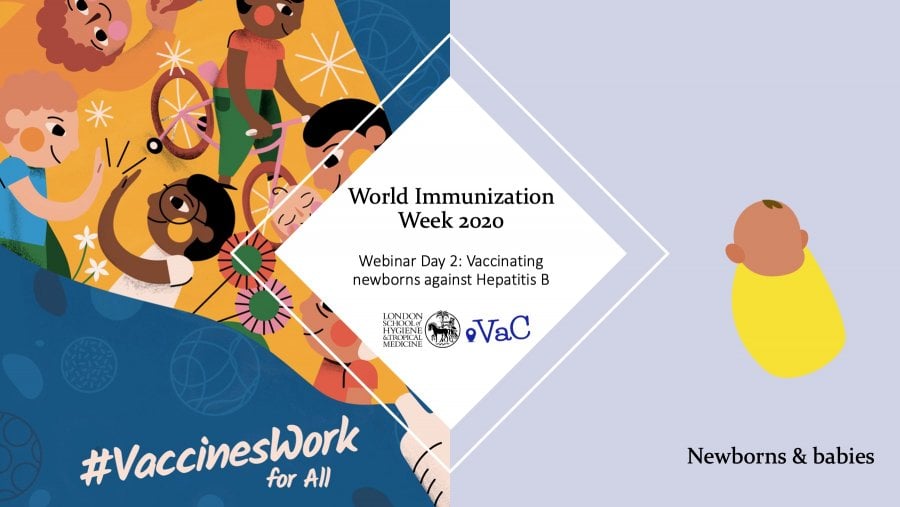Vaccinating newborns against Hepatitis B
This World Immunisation Week, join us for a series of webinars hosted by LSHTM Vaccine Centre between Friday 24 April to Friday 1 May 2020.

Hepatitis B is an infection of the liver caused by a virus that is spread through blood and body fluids. Worldwide, over half a million people die from this infection each year, whilst we have a vaccine to prevent it. Hepatitis B vaccination is routinely available as part of the NHS vaccination schedule and is offered to all babies at 8, 12 and 16 weeks of age. It is also part of the routine vaccines given at birth in many endemic countries around the globe, as recommended by the WHO- nevertheless it does not reach all who should receive it.
In July 2019, the World Health Organization (WHO) announced that 189 countries now provide the vaccine for infants on a national level, but the global coverage of the birth dose is just 42%. The birth dose is significant for a number of reasons. Ninety percent of babies and up to 50% of young children will progress to chronic hepatitis B if they are infected. The vaccine gives protection against the hepatitis B virus, which is a major cause of serious liver disease, including scarring of the liver (cirrhosis) and liver cancer.
This session will address the global burden of Hep B and focus on the value of the birth dose. It will discuss reasons why it is not implemented more successfully and propose what could be done about this issue.
Speakers
- Professor Beate Kampmann: Professor of Paediatric Infection and Immunity, Director of the Vaccine Centre, LSHTM & MRC Unit The Gambia at LSHTM Theme Leader
- Dr Maud Lemoine: Reader and Honorary Consultant in Hepatology at St Mary’s Hospital, Imperial College London, UK
-
Dr Maud Lemoine is a Reader and Honorary Consultant in Hepatology at St Mary’s hospital, Imperial College London, UK. She completed her medical degree and PhD in Paris, France. She also graduated in political sciences from the Institute of Political Studies in Paris. Her research activities are mainly focused on the prevention and management of viral hepatitis in resource-limited countries, mainly in Africa. Since 2011, she has been working with the Medical Research Council (MRC) The Gambia unit, as part of the hepatitis B PROLIFICA (Prevention of Liver Fibrosis and Cancer in Africa) programme in The Gambia and Senegal.
She has been member of the WHO guideline development group for the management of chronic hepatitis B/C and is regularly commissioned by the WHO viral hepatitis unit for external reviews and consultancies.
- Dr Gibril Ndow, MRC Unit The Gambia at LSHTM and Imperial College London
-
Dr Ndow is clinical research fellow at the Division of Digestive Diseases, Imperial College London. He is based at the MRC Unit The Gambia at LSHTM where he leads the Viral Hepatitis Research group, supervised by Dr Maud Lemoine and Prof Umberto D’Alessandro.
Feel free to submit your questions about this webinar session by entering your enquiries via this form.
Admission
Contact



